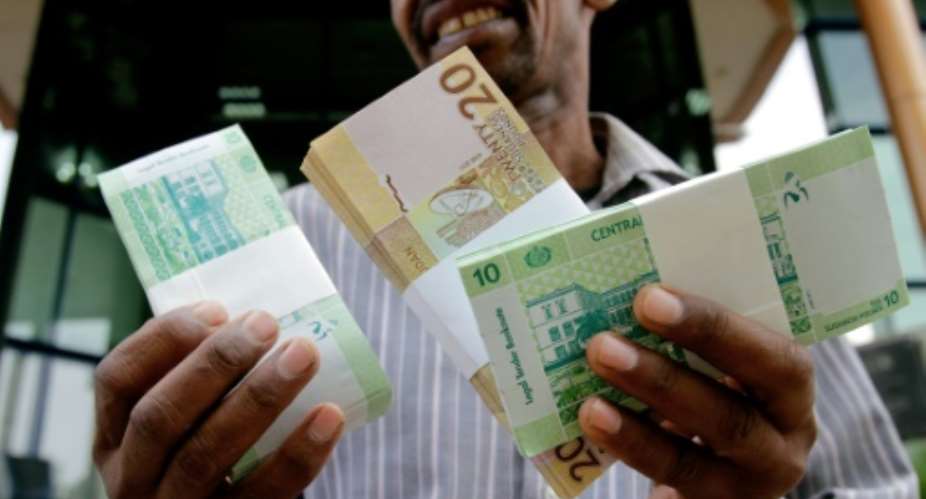The Sudanese pound hit an all-time low against the dollar on the black market Tuesday, brokers said, fuelling concerns of soaring inflation as importers rushed to buy the US currency.
On Tuesday, the pound reaching 30 to a dollar on the black market, its lowest level ever. The official rate is 18 pounds to a dollar.
An acute shortage of dollars has weakened the Sudanese pound steadily, with the currency losing about 60 percent in the past year on the black market.
"The pound touched 30 on the black market today as corporates and businessmen rushed to buy dollars to meet their import payments," a broker said on condition of anonymity.
Trading on the foreign exchange market has been very volatile since October 12 when Washington lifted its 20-year-old trade embargo imposed on Khartoum.
Authorities have even arrested dozens of black market traders in a bid to curb the speculation.
The pound was expected to strengthen against the greenback after the embargo was lifted, but it has only slipped since then.
Despite the lifting of the restrictions, banks across the world remain wary of working with Khartoum, officials say.
"We did not benefit from the lifting of the embargo. World banks are still reticent about doing business with Sudanese banks," Finance Minister Mohammed Osman al-Rikabi said last week.
Although Washington lifted the embargo it has still kept Sudan on its list of "state sponsors of terrorism," a factor which officials say keeps investors away from the east African country.
The weakening of the pound has contributed to surging inflation, which currently is at 34 percent.
Last week protests erupted in several parts of the country, including in Khartoum, after the cost of bread soared on the back of rising flour prices
A student was killed in protests on Sunday.
Bread prices more than doubled after the cost of flour jumped to 450 Sudanese pound ($25) for a 50-kilo (110-pound) sack from 167 pounds.
Sudan's economy has also been suffering from the loss of three-quarters of its oil resources when South Sudan gained independence in 2011.
Years of conflict with rebels in the vast western region of Darfur and the southern Blue Nile and South Kordofan states has also rocked the country's economy.





 Dumsor: Don't rush to demand timetable; the problem may be temporary — Atik Moha...
Dumsor: Don't rush to demand timetable; the problem may be temporary — Atik Moha...
 Space X Starlink’s satellite broadband approved in Ghana — NCA
Space X Starlink’s satellite broadband approved in Ghana — NCA
 2024 election will be decided on the grounds of the economy; choice of running m...
2024 election will be decided on the grounds of the economy; choice of running m...
 Dumsor: We're demanding less; just give us a timetable — Kwesi Pratt to ECG
Dumsor: We're demanding less; just give us a timetable — Kwesi Pratt to ECG
 Do I have to apologise for doing my security work, I won’t – Simon Osei-Mensah r...
Do I have to apologise for doing my security work, I won’t – Simon Osei-Mensah r...
 All my businesses have collapsed under Akufo-Addo — NDC Central regional chair
All my businesses have collapsed under Akufo-Addo — NDC Central regional chair
 Military, Prison Officers clash in Bawku, three injured
Military, Prison Officers clash in Bawku, three injured
 GRA-SML contract: MFWA files RTI request demanding KPMG report
GRA-SML contract: MFWA files RTI request demanding KPMG report
 Court threatens to call second accused to testify if NDC's Ofosu Ampofo fails to...
Court threatens to call second accused to testify if NDC's Ofosu Ampofo fails to...
 Family accuses hospital of medical negligence, extortion in death of 17-year-old...
Family accuses hospital of medical negligence, extortion in death of 17-year-old...
